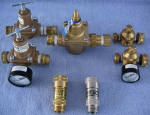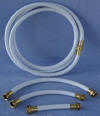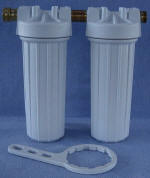Library Contents Search the Library RV Tech Library Help Page Site Map About Us Tiffin RV Network TRVN Classifieds Campground Reviews Photo Gallery TRVN Store
Appliances Batteries Boondocking/Dry Camping Chassis Clubs & Forums Electrical Electronics Engines Exterior Maintenance Generators Heating & Air Conditioning Interior Maintenance Misc Items Operating Tips Plumbing Red Bay Safety & Health Storage Supplier Contacts Tires and Wheel Rims Towing Transmissions Weighing

Water Pressure -
You Either Have It or You Don't
![]()
Low Pressure will Drive you Crazy - High Pressure will Burst your
Pipes - What's a Person to Do?
A frequent complaint we hear on the forum is that they don't have very good water pressure supplied to their RV. It's usually too low, and they can't get enough water to take a decent shower. Sometimes, it's too high, and they are afraid of bursting their plumbing. Experience on the road, has taught us, that you will encounter both types of problems, every RV park has different water pressures. But there are very reliable ways of overcoming them. First, let's explore the problems in more detail.
Pressure or Flow - What's the Problem?
Many people don't understand the difference between pressure and flow, but you need to in order to solve your problem. "Flow" is a measure of volume of water delivered in a period of time. The poor shower is caused by low flow, as are most other RV water supply problems. "Pressure" is a measure of the force of the water, and it is measured when no water is flowing ("static" pressure). It is true that for a given plumbing system, the higher the pressure, the better the flow. However, there is a practical limit to increasing pressure to improve flow.
Don't Let Your Pressure Get Too High
Tiffin Products - the plumbing systems are usually tested to a pressure of about 100 to 125 pounds per square inch (psi), but to prevent warranty problems, some RV manufacturers may recommend only 40-50 psi. Unfortunately, this may not provide the shower you're looking for. Most house plumbing operates at about 60psi, and this can be adequate for RVs, too. If your water supply pressure is approaching 100 psi, you are risking an expensive failure of your plumbing system. You should limit your pressure to 60-65 psi to be safe, and to do that, you may want to install a pressure regulator ( Perhaps the adjustable type).

Causes of Low Flow in RVs
Size matters, particularly in regard to water flow through pipes and orifices, and the bigger the better. Anything that reduces size in a plumbing system creates a restriction to flow. Restrictions can occur at any point in your RV from the park's valve to your kitchen sink or shower, and they are cumulative. Several modest restrictions in your plumbing system can drastically reduce the flow at the shower head. So, let's start at the beginning of your water supply line and look at causes of restriction and fixes available.
It Starts With The Hose
The hose you use to connect your RV to the water supply may be the first cause of flow restriction. Many RV water hoses are pretty cheap, and they are prone to kinking or collapsing. If your hose does that, you are suffering from a flow restriction. The solution here is to use a better hose that resists deformation.
(Personal Note: A good water hose costs more and the non-kinking type, in my opinion are worth the extra cost.)

Pressure Regulators Also Cut Flow
We mentioned pressure regulators earlier and think they are a wise investment. However, while protecting you from excess pressure, they may be seriously reducing your flow. Like many plumbing fittings, regulators inherently restrict flow, but some are worse than others. Generally speaking, the more expensive regulators can accommodate a much greater flow of water than the cheap ones. A complete line of pressure regulators, including industrial-strength, high-flow, adjustable units are available.
Filters Can Reduce Flow Significantly
Filters work by forcing water through very small orifices to strain out the contaminants. Fortunately, there are a huge number of "holes" in a filter, and the bigger the filter unit, the more "holes" it has, and the better the flow. So, to achieve better flow through a filter, use a bigger filter that has more filtration area. A small, in-line filter restricts flow more than a 10-inch standard canister, and the standard canister is more restrictive than a jumbo canister. So, if you are using filtration on all of the water used in your RV, you will want to go with the largest filtration system that will fit your needs to avoid flow restrictions. Another factor to consider with filters is that as they get plugged with contaminants, their flow rate decreases. If you find your flow rate dropping when you are using filters, it may be time to clean or replace them. (I personally change ours every 6 mo.)
Conversely, if you never notice a decrease in flow, you'd better check to see if your filter is working!

Internal Plumbing Systems may Be Inadequate
Some RV manufacturers will scrimp on anything and everything to cut costs, and this includes the plumbing system (Tiffin excluded). Undersize pipe and restrictive fittings can contribute to the low-flow problems you experience. If you check the flow in a brand new RV that is hooked up to a municipal water system, everything may look good. But, if you take this same rig out to an RV park and hook up a pressure regulator and a filter, it may suffer. Unfortunately, there is not much you can reasonably do to improve an RV's plumbing.
Fixtures Can Also Seriously Reduce Flow
Your plumbing fixtures are the final place that flow restrictions can occur. Sink faucets and shower valves often have very small orifices that seriously limit the amount of water that can pass through them. Sometimes, these restrictions are removable, and are included to meet Federal water consumption standards. In any case, you can find better-flowing fixtures by carefully shopping around.
![]()
Tip: Check the little faucet screen filters that screw into or on the end of your faucets. These can become plugged with grit etc. and further reduce the flow.
Submitted by Mike Sundberg - 3/15/06
Some source material from RV Water Filter Store – www.rvwaterfilterstore.com
The RV Tech Library is brought to you by the TiffinRVnetwork
Absolutely No Affiliation exists between this group and Tiffin Motor Homes Inc or the Allegro Club. This website neither endorses or discourages the use or purchase of a Tiffin product. All references, suggestions, comments, etc. contained herein are the opinions/experiences of the posters and not those of Tiffin Motor Homes Inc. or the website administrators.



